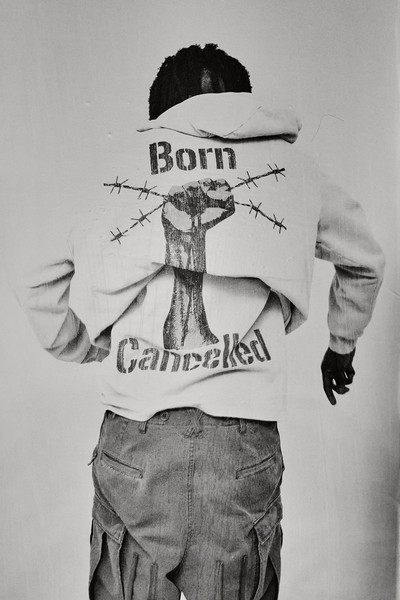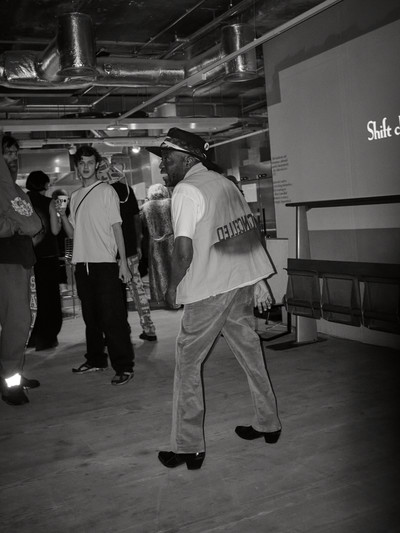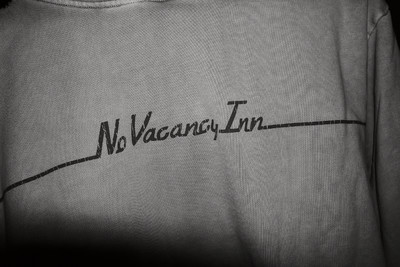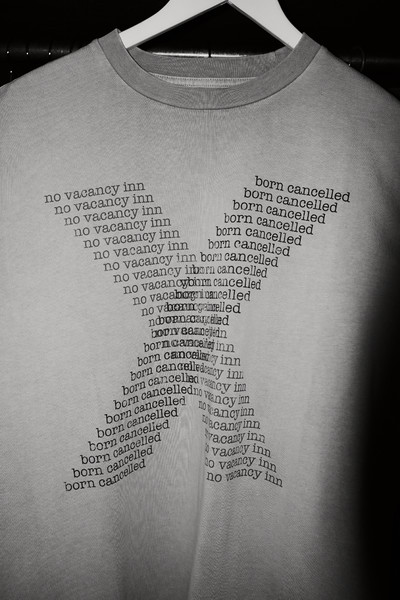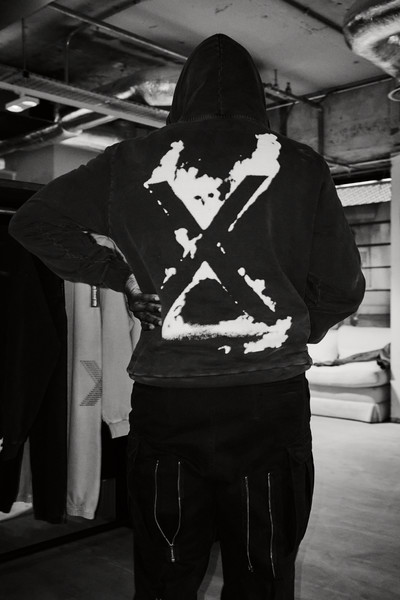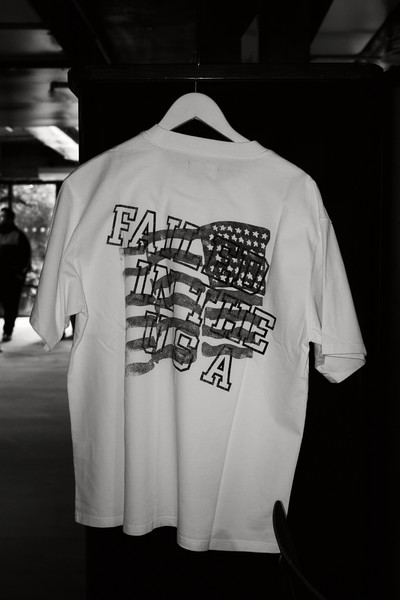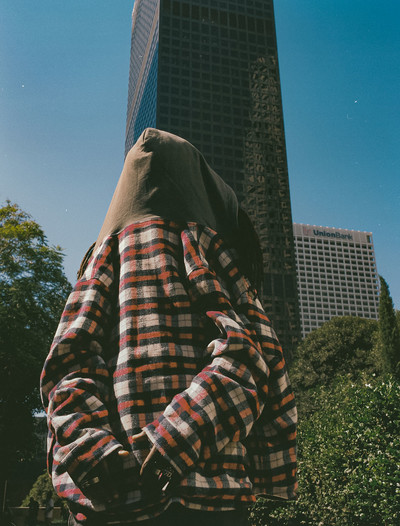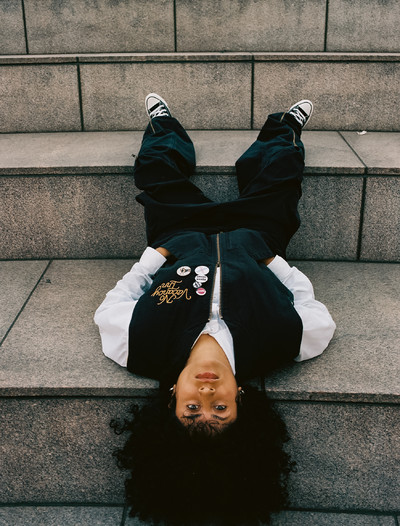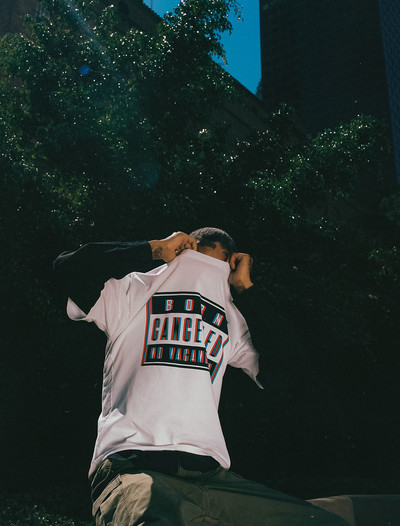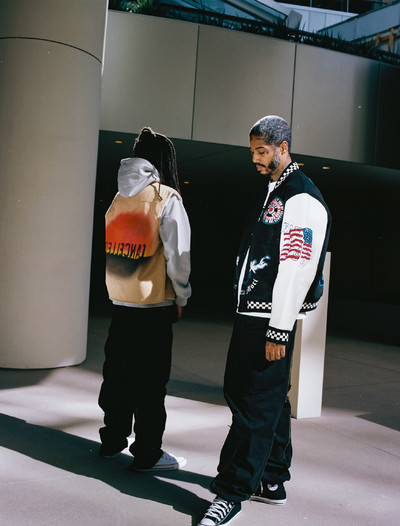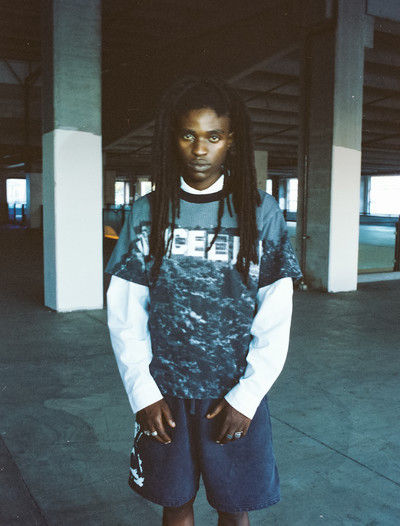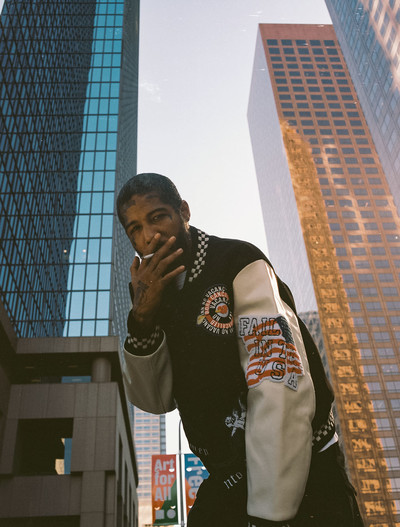No Vacancy Inn’s Born Cancelled collection fiercely examines music and counterculture to raise a sartorial call-to-arms against cancel-culture.
By Rahim Attarzadeh
Photograhs by Rafa Yuste
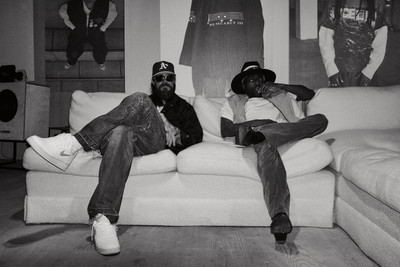
No Vacancy Inn’s Born Cancelled collection fiercely examines music and counterculture to raise a sartorial call-to-arms against cancel-culture.
For No Vacancy Inn, the foundations of what is now defined as cancel-culture lie within the prerequisite of privilege. To luxuriate in the long list of those who have been cancelled is to luxuriate in the proximity of the upper echelon.
Today, the visionary collective – founded in 2015 and formed by cultural provocateurs, or as they prefer to call themselves, ‘cultural anthropologists’, Ade Odunlami (better known by his alter-ego Acyde), Brock Korsan and Tremaine Emory are back from a brief hiatus with their latest capsule collection entitled Born Cancelled.
In their typically-satirical undertone, the Born Cancelled collection is a pun against what the trio deem to be the seemingly hypocritical paradigm of cancel-culture. The implication being that a cancelled individual has something of worth to take away; whether it be from a place of inner authority, or a position its peripheral domains occupy. The members of No Vacancy Inn believe you cannot cancel those who never had anything to lose to begin with. The collection is the aesthetic result of Acyde’s occasional dictum in utilising clothing as a ‘Trojan Horse’ to foster fearlessness in the youth. No Vacancy Inn echoes a voice for those who have felt ‘cancelled’ from the very beginning.
‘Born Cancelled is a rebel yell. For every kid who was ever cancelled for one mistake. Kicked out, stepped over, picked on,’ explains Acyde in response to how he sees the collection appealing to those who have always felt neglected. To those whose paths have been made irremediable, the thought of being ‘cancelled’ is just, as Pink Floyd once sang, “Another Brick In The Wall”.
Aviation pants and embellished vests revel in an elevated homage to the autonomy of the late 80s hardcore and punk movement in Los Angeles. Printed t-shirts are met with Korsan’s tongue-and-cheek approach to design, showcased through ‘Failed in the USA’ slogans. Reimagined Hollywood signs are replaced with NVI’s ‘Cancelled’ motif to showcase No Vacancy Inn’s retouched snapshot of a twisted Americana. The collection in-turn paints an era adorned by memories of anti-establishment anarchy that posterity has since consigned to a naive twilight period.
Here, System speaks with NVI founders Korsan and Acyde to discuss the inner sanctum of Born Cancelled, why the term ‘limited edition’ really isn’t that limited and what it means to shatter the barriers between the disciplines of fashion, music, curation and events. In summary, No Vacancy Inn has proven the irreverent birthplace of an aura built on the allure of fashion’s B-side, or in other words, the universal dialect of style.
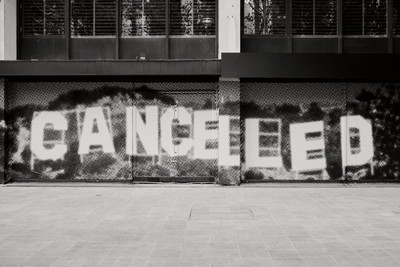
No Vacancy Inn x Born Cancelled London launch at 180 Strand.
Acyde. You’ve often opted to remain in the shadows despite having a lot to say. Let’s start the interview by discussing interviews. Love them? Loathe them? A necessary evil?
Acyde: It purely depends on who’s interviewing us and what it’s for. Most journalists like to ask anodyne questions. There can be that rare occasion where an opportunity to provoke good conversation occurs. What I say in interviews may not be your typical subscription to ‘industry opinion’ so it’s more about speaking when I can speak my truth. Nothing we do is automated.
That bodes well for this interview. You’ve just announced the return of No Vacancy Inn with a collection entitled Born Cancelled. It’s clearly a pun on cancel culture, yet in a stylistically anarchic undertone. Creativity born out of irreverence. Has that become a No Vacancy Inn trademark?
Brock Korsan: We’ve always had this irreverent approach in our ability to come up with ideas. I guess that comes from feeling like we never fit into a particular box. Recently, we’ve been surrounded by press clippings around cancel-culture – some cases being more dubious than others and that made us question the entire notion of the movement. Who can be cancelled and who are the people doing the cancelling? Born Cancelled is a counter-cultural reaction to culture. That’s what we do best. It was meant as a joke between myself, Tremaine and Acyde which formed into a series of ideas and now we have a collection.
‘We would never make clothing that we wouldn’t wear ourselves, or clothing that doesn’t represent our world. Wouldn’t that be disingenuous of us?’
Do you find that fashion and youth culture is more politically-activated now than it was in the past? Fashion has paved the way for some of the most documented and prolific stylistic eras to date. We’ve seen it all. Nowadays designers release collections that are more reactionary to the current state of politics. We are living in the block capitals of Katharine Hamnett’s infamous slogan t-shirts. Is a No Vacancy Inn project more reactionary than it was when you guys started out?
Acyde: I’ll tell you what it is. When you have friends who share the same interests as you, the connection you share is much more than just gossiping together or doing nothing that really matters at all. When we’re hanging out, we’re talking about a new film, or a new book, or a new exhibition, or to answer your question, what’s going on in politics. From those different entry points, ideas start to formulate. Sometimes they are catalysed by politics because we live in a far more reactionary world today. Sometimes it’s more about the subcultural interests we all share. I’ll be like, ‘Tremaine, have you heard that Jazz record?’ Or ‘there’s this creative director you should be working with.’ Our conversations revolve around shared interests which result in shared ideas and creative sessions. The Red Hot Chilli Peppers call it ‘jamming.’
Brock Korsan: No Vacancy Inn is anecdotal. It’s what we deem to be a ‘smartass response’ to something going on around us. That usually results in a physical product. In this case, conversations around cancel culture but intertwined with our interests in the subversion of style and subculture. That formed the foundations of Born Cancelled.
The fabrics in the collection are an authentic emblem of the subculture the collection reimagines. In this case the late 80s Hardcore and Punk scene in Los Angeles. The clothes give off that effervescence of nonchalance that you all incorporate into your own personal style. The varsity jacket was designed by your close friend and visual artist Cali DeWitt. You always seem to bring in those members of your inner circle. People you consider stylish and insightful. Whilst you’ve often said NVI is ‘intentionally not a fashion brand’; you’re clearly aware of the industry and what you seek to create aesthetically. Does style give you freedom that fashion perhaps doesn’t?
Brock Korsan: To have a sense of style is to have very staunch taste. Style gives the customer something personal, which not all fashion is able to provide. We would never make clothing that we wouldn’t wear ourselves, or clothing that doesn’t represent our world. Wouldn’t that be disingenuous of us?
‘It’s an exchange of ideas, not a dictatorship of style. I don’t want to ever lose sight of our ability to communicate with the youth.’
Patti Smith once said: ‘Punk Rock is the freedom to create; the freedom to be successful; the freedom to not be successful and the freedom to be who you are.’ Is No Vacancy Inn your pursuit of creative freedom?
Acyde: It’s a freedom in accepting the realities of how hard it is to produce attractive clothing, whilst producing clothing that you actually want to make. I know a lot of people will think something stupid like ‘it’s just a t-shirt.’ Do you know how hard it is to make a good t-shirt when everyone around us is doing the same thing? We’ve been doing this for years but it takes that long to produce clothing at a certain standard. We’ve had to achieve that level over time to have that freedom you’re referring to. Freedom comes from trust garnered over time and people wanting to buy your product because it speaks to them on a personal level. It’s not something you can achieve out of thin air. We deal with it in every project we take on. How can the next project be better so that we can spread the message at a higher magnitude?
I’m going to use the term streetwear because I always have and it should allude to what people are wearing on the street today. Similarly to its origins when people once wore Malcom McLaren and Vivienne Westwood’s creations in the late 70s, streetwear was always about making clothing born out of instinct and clothing that is deeply rooted in storytelling. How important is it for the clothes to tell a story and not just act as a ‘collection’, or an excuse to buy another t-shirt?
Acyde: I once said that we use clothing as Trojan Horses to tell stories. What we do has to be representative of us. It’s an extension of our three brains. Let’s call it a combination-effect. We want the customer to feel like they are buying into who we are because they like what NVI stands for – independence and irreverence but also a voice for the youth that encourages them to wear what they want to wear, not what they should wear. It’s not that dissimilar to the mindset of what you’re referring to in London in the late 70s.
What do you think of the ‘drop system’ and the term limited edition? There’s a dichotomy at play here, because on one hand we recognize the democratisation of subculture, but on the other hand, the notion of limited availability can be applied to almost everything.
Brock Korsan: I think it’s a consumer trick. If you’re a shopping addict, then maybe it’s still a sexy word but if you’re stylish, you know what you want, therefore the term ‘limited edition’ becomes obsolete.
‘If you’re a shopping addict, then maybe it’s still a sexy word but if you’re stylish, you know what you want, therefore the term ‘limited edition’ becomes obsolete.’
Do you find that you have a more discerning eye now, as opposed to when you launched No Vacancy Inn in 2015? Has that impacted what you want to create? Will we soon see a No Vacancy Inn trademark spread across multiple collections? All the subcultural figures around the realms of fashion and music that you’ve admired had or have a signature when it comes to their dialect of style. Whether that be Miles Davis or Hedi Slimane.
Acyde: As I grow older, I’ve started to take things less literally. There is a certain creative freedom in understanding that change is also part of being human. Your quote on quote ‘style’ is the ability to incorporate that into everything you do. Rick Rubin has this rule about success and music. If you’re in a band, the easiest way to remain successful is to never change after your second album. If you make two albums that are similar, which people love and the third is something completely off-kilter, then you will inevitably lose your earlier fanbase. But if you’re consistently switching styles after every album, then change becomes your signature. That’s why I’ve always been into ephemera – knowing how to champion short-lived moments into moments of allure and attraction. That’s what NVI is about.
So change itself is inevitable. It’s more about mastering the art of knowing when to implement that change?
Brock Korsan: It all comes back to curiosity. As an artist, if you’ve put out incredible work, then curiosity leads you to want to challenge yourself further and see what you’re able to accomplish next. We’re driven by that. The visceral desire to not allow yourself to be put into a box and fall into becoming boring, or redundant. There are people who want to be successful because they adhere to that one formula that always worked for them. However, we’re more curious to see how far we can go by pushing things further. How far can we evolve?
Does youth culture today impact what you want to release, or who you want to work with? You have each championed the ability to work with creatives of all ages and all backgrounds. Whether that be Tremaine collaborating with David Hammons on a pair of Converse for Denim Tears, or No Vacancy Inn working with ASAP Nast on a Stüssy collaboration. The spirit of your collaborators is ageless. Do you see these individuals and these brands as avatars and beacons of quality that all possess the same spirit?
Acyde: The kids today live in a world where they want to buy the clothes. Clothing is no longer secondary to culture. It’s instrumental. Therefore they make the decisions. They talk and they decide which t-shirt is cool, or what music they want to listen to. We don’t see ourselves as gatekeepers; in fact we hate the term. Can we call ourselves cultural anthropologists? We want the kids to decide what’s cool and what isn’t. We can then use our experience to make that product a reality. It’s an exchange of ideas, not a dictatorship of style. I don’t want to ever lose sight of our ability to communicate with the youth. Brock will go to any music event to see who’s next on his radar, or just to see what the f**k is going on! Tremaine will talk to any kid on the street and give them his phone number. There is power in the ideology of fostering a community.
‘The best way to inspire people is to be living proof of an idea that preaches change.’
What message do you want to communicate through Born Cancelled?
Acyde: We want Born Cancelled to show people that there is another way to exist in this world and to ultimately inspire them. That’s aside from the prescribed way of living you’ve been taught about through your parents at church, or your friends on your soccer team. If you want to express yourself differently, then there is no one out there who can stop you from doing so apart from yourself. The best way to inspire people is to be living proof of an idea that preaches change.
Born Cancelled full collection available via novacancyinn.com
